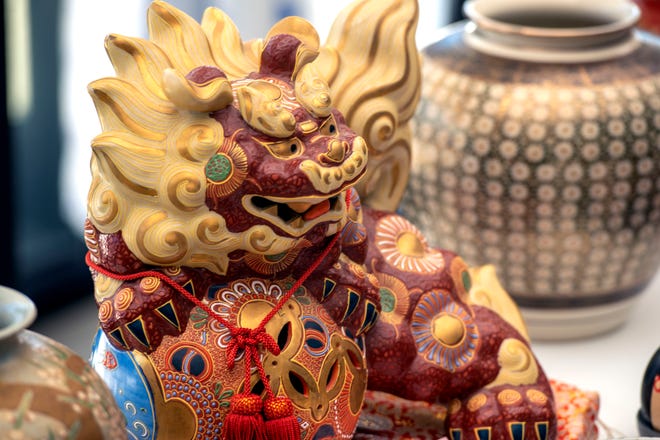Chinese New Year history, superstitions, horoscopes

This year, Chinese New Year falls on Feb. 1. Also known as Lunar New Year or the Spring Festival, it is an important holiday in China, as you might have guessed. Tied to the Chinese lunar calendar, the holiday is a time for celebrating and feasting, along with honoring household and heavenly deities and ancestors. Inscribed oracle bones with astronomical records indicate that the calendar existed as early as 14th century B.C. Because the Lunar New Year depends on the moon, the date of Chinese New Year changes each year, but it will always fall between Jan. 21 and Feb. 20.
While there are many stories, one fun legend tells the story of how the Chinese started keeping track of the passage of time by naming the years after different animals. Within the Chinese zodiac, there are 12 animals that gathered together for a race in the countryside. Each of the animals carried traits (both positive and negative) that helped them to advance in the race. The animals came through the finish line in this order: rat, ox, tiger, rabbit, dragon, snake, horse, goat, monkey, rooster, dog and pig.
2022 is the Year of the Water Tiger. The tiger is known as the king of all beasts in China and is associated with bravery, confidence and strength. Also known to be strong-willed, opinionated and stubborn, the tiger years are 1938, 1950, 1962, 1974, 1986, 1998, 2010, 2022, 2034.
Jump on in with the tigers:Embrace the bandwagon fans hopping aboard, Bengals fan.

Along with celebrations with family and friends, Chinese New Year includes traditions, superstitions and food. For cultural custom, businesses will close for the day in order to focus on home and family. It’s considered important to take the day to enjoy yourself, eat well and do things you enjoy. Prior to the big day, houses and businesses are thoroughly cleaned to rid them of the previous year. It is akin to starting off with a clean slate.
Many Chinese families have an altar dedicated to their ancestors. Sacrifices of food and paper “money” are offered to make the ancestors happy. Many also post printed scrolls scribed with lucky messages on front doors and entryways. Adults give out red envelopes containing money to employees and children. Sometimes, fireworks are set off throughout the holiday to mark the new year, but they are also to ward off bad spirits. In many provinces in China and select Chinatowns in the United States, celebrations last for the entire month.
On the eve of the new year, families gather for an extravagant meal that includes jiaozi, also known as dumplings. They are considered lucky because they resemble traditional coin purses in ancient times, representing wealth and abundance. Another menu item is nian gao, a rice cake that is sticky and compact, made of glutinous rice flour and can be either sweet or savory.

Noodles, believed to represent long life, are also another staple for the dinner table. Typically prepared sauteed with vegetables, meat and seafood and sometimes broth, they are referred to as “longevity noodles.” The simple most important item to serve is a whole fish as the Chinese believe that it signifies prosperity for the upcoming year. In the Mandarin dialect, the word for fish loosely translates to “surplus” or “extra leftover.”
10 Chinese New Year superstitions
Whether you believe it or not, here are some superstitions to ponder.
- Don’t sweep or take out garbage. The idea here is that if you do this on New Year’s Day, you’ll be sweeping wealth away or taking good fortune out of the house by taking out the garbage.
- Use your words wisely. Refrain from swear words or arguing. Speak of prosperity and good luck so that more of that will be welcome in the upcoming year.
- Avoid washing hair and getting a haircut. It is seen as “washing one’s fortune away” at the beginning of the year. Get a new haircut or get a new hairstyle before Chinese New Year for a new look and start in the upcoming year.
- Along with no hair washing, don’t wash clothes. According to Chinese lore, to wash clothes is regarded as disrespect to the god of water. Wait three days after the new year to do your laundry.
- Avoid using scissors or knives as they are sharp and believed to “cut ties” with friends and family.
- When giving red envelopes containing money to children, make sure the amount is even. Chinese believe even numbers are lucky. The only exception to this rule is unlucky numbers such as 4 and 40 because the number 4 sounds like the word “death” in Chinese.
- Wear red because it’s vibrant and the same color as the envelopes that contain money. Avoid wearing white as it represents mourning or death.
- Chinese believe wearing new clothes and shoes will symbolize wealth and abundance in the upcoming year. Consequently, if purchasing a new outfit is not within your budget, avoid wearing damaged clothes as they symbolize “rags.”
- Avoid lending and borrowing money.
- Avoid visiting hospitals.
While some of these superstitions sound unavoidable or “out there,” they’re based on old rites that have been passed through the ages, so proceed with a grain of salt and enjoy the new year.

Chinese horoscopes
While growing up, the fun part was reading about the various traits of each animal associated with our birth year. The zodiac animal is oftentimes used to assess the future of a child born during that year. Similar to Western astrology, horoscopes also exist for the Chinese zodiac.
- Rat (1948, 1960, 1972, 1984, 1996, 2008, 2020) – quick-witted, resourceful, flexible, smart.
- Ox (1949, 1961, 1973, 1985, 1997, 2009, 2021) – hardworking, dependable, strong, determined, thrifty.
- Tiger (1950, 1962, 1974, 1986, 1998, 2010, 2022) – brave, confident, versatile.
- Rabbit (1951, 1963, 1975, 1987, 1999, 2011, 2023) – quiet, kind, homebody.
- Dragon (1952, 1964, 1976, 1988, 2000, 2012, 2024) – confident, temperamental, powerful.
- Snake (1953, 1965, 1977, 1989, 2001, 2013, 2025) – charming, wise, intelligent.
- Horse (1954, 1966, 1978, 1990, 2002, 2014, 2026) – freedom-loving, spirited, independent.
- Goat (1955, 1967, 1979, 1991, 2003, 2015, 2027) – gentle, quiet, empathetic.
- Monkey (1956, 1968, 1980, 1992, 2004, 2016, 2028) – quick-witted, sharp, natural.
- Rooster (1957, 1969, 1981, 1993, 2005, 2017, 2029) – likes being the center of attention, outgoing, observant, speaks the mind.
- Dog (1958, 1970, 1982, 1994, 2006, 2018, 2030) – loyal, diligent, adventurous.
- Pig (1959, 1971, 1983, 1995, 2007, 2019, 2031) – thoughtful, generous, soft-spoken.







